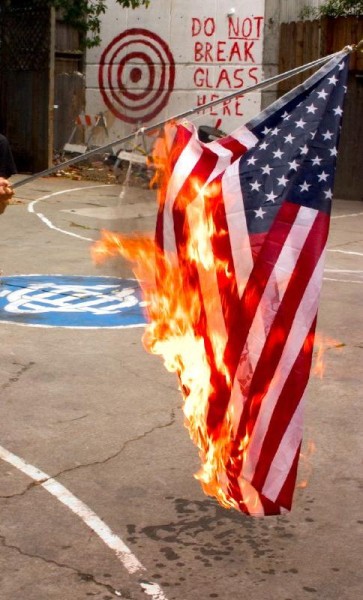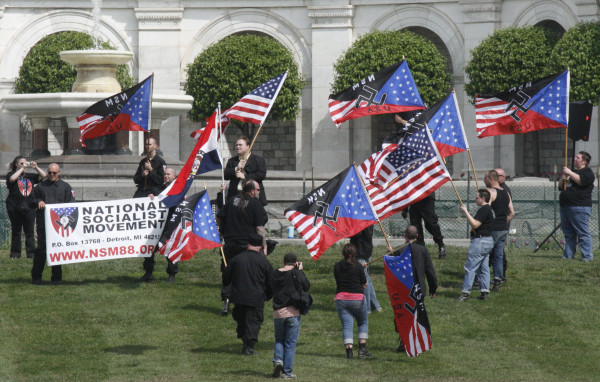Yesterday I discussed First Amendment forum doctrine as it related to Texas’s specialty plate program. Today I discuss the subject where everyone learns to stop worrying and love censorship: “offensive” speech.

“Offensive” speech
Texas denied Texas SCV‘s design because “the design might be offensive to any member of the public” (emphases added). A mere possibility of offense, to a single person, allows Texas (if it wants, as a matter of even-handed objectivity and fairness) to tell the plate requester to pound sand.
What does the First Amendment say about “offensive” speech? Offensive speech particularly is strongly protected. The First Amendment lets you victim-blame soldiers at their own funerals. It lets you burn the American flag, notwithstanding that this “seriously offended” several witnesses. It lets you satirically attribute false quotations to someone implying that his first sexual experience occurred in an outhouse with his own mother…after kicking out the goat. It protects the right to wear an undoubtedly-offensive jacket bearing the words “Fuck the Draft”. It protects a student newspaper cover depicting police officers raping the Statue of Liberty. It lets you falsely claim to have received the highest and most respected of military awards, in some sense diminishing that award’s value. The list goes on and on.
The First Amendment was designed to protect offensive and unpopular speech, full stop. “If there is a bedrock principle underlying the First Amendment, it is that the government may not prohibit the expression of an idea simply because society finds the idea itself offensive or disagreeable.” “The fact that protected speech may be offensive to some does not justify its suppression.” As the Court stated regarding a more restrictive forum than the public sphere where license plates reside, “The mere dissemination of ideas — no matter how offensive to good taste — may not be shut off in the name alone of ‘conventions of decency.'”
In short, Texas is horribly wrong to think it has authority to censor offensive specialty plate designs based on “levels of offensiveness” (which, we must remember, was Texas’s post hoc rationale, not anything in the law).
Could the Confederate flag be “fighting words”?
Is some offensive speech nonetheless unprotected? Yes, but it must be fighting words that “by their very utterance, inflict injury or tend to incite an immediate breach of the peace.” No one here argues Texas law is really trying to criminalize fighting words, because doing so would run into (at least) two major problems.
First, Texas concedes that Texas SCV could display a bumper sticker with identical design on vehicles. But it’s irrational to think moving a hypothetically-inciting message a few inches would change that aspect of its nature. If a plate design met that standard, then so would a bumper sticker, and both could be forbidden.
Second, Texas’s “might be offensive to any member of the public” rule goes far beyond fighting words. “Choose Life” or “Respect Choice” specialty plates (or even “All Lives Matter”, which is clearly offensive and you should check your privilege, you racist member of the patriarchy) would offend some people. But it’s inconceivable (not meant that way) these could ever be considered fighting words, rather than protected political statements.
If Texas were to argue its “offensiveness” standard addressed fighting words (and it doesn’t), the statute would be substantially overbroad in criminalizing too much speech and accordingly vulnerable to challenge. Even Texas isn’t stupid enough to try to argue this.
What about “hate speech”?
The First Amendment protects hate speech. You can burn a cross on your own property without intent to intimidate, and it’s protected speech. You can hold a Nazi parade on public streets, even if Holocaust survivors say that “seeing the swastika was like being physically attacked.” You can make various forms of pornography that “subordinat[e] women” in a variety of reprehensible ways, and laws against such will be struck down.
And the recent American kerfuffles over various fraternities’ obnoxious racist speech pretty much all constitute protected speech, for which the perpetrators have been widely judged protected from punishment by public universities. (The universities can get away with whatever punishment they want if the perpetrators won’t stand up for themselves in court. [An action which doesn’t prevent a sincere apology and work toward rehabilitation.] Fortunately, not all universities [#notalluniversities] [#butmost] have forgotten their duties under the First Amendment and their obligations to protect academic freedom even when it hurts.)
The imagined “hate speech” exception to the First Amendment, and to freedom of speech more generally, doesn’t exist.
I see. So you’re a racist bigot standing in the way of progress and social justice?
No. There are plenty of horrible forms of expression that nonetheless are protected by the First Amendment, and should be protected. I don’t need to agree with anything anyone says in order to defend their right to say it. (But by all means continue with the insults! I appreciate the encouragement.)
But consider the alternative to allowing all this speech. Suppose we really did think it was okay to punish some of this speech. What neutral arbitrator is going to decide which categories of speech are okay and which are not okay? Who’s going to neutrally enforce such laws in a non-discriminatory manner? There is no neutral arbitrator: rather, the majority will. And history shows that when a majority has the power to censor, it’ll censor things according to its own interests, not according to some “neutral” perspective able to judge what speech is and isn’t permissible.
Indeed, when the standard is that “offensive” speech is prohibited, aren’t minority views precisely those most likely to be deemed offensive? Inoffensive views aren’t the ones that need protection. Rather, it’s the offensive views that need protection, because majorities often aren’t inclined to protect offensive views. Nobody’s going to complain when someone says “Stop Child Abuse”, but they might about a discussion of then-offensive homosexual marriage.
Offensiveness and correctness aren’t always in agreement
Protecting offensive speech is particularly important because because offensive views may also be right. Martin Luther opening a scholarly debate among theologians about corrupt Church practices in the Ninety-Five Theses offended Johann Tetzel and the Church. (Whether or not Luther or the Church was right, I think we can generally agree the world is a better place for that debate having taken place.) Galileo’s astronomical hypotheses offended many astronomers of the day, and notoriously the Church. John Quincy Adams’s speech in bringing petitions “about” slavery before Congress, where Southern congressmen, fearful of what petitions on the topic of slavery might say, had previously voted in a rule to immediately table any petition on the subject, offended those congressmen. Paul Robert Cohen offended many people in protesting a draft later ended, attributable to some small degree to his speech about it. Archie Bunker epitomized bigotry, yet without it All in the Family couldn’t have made the points it made. (Query whether they could make that series today without being shouted down by the congenitally-stupid.)
It’s easier to judge people who say offensive things
Additionally, offensive speech permits the observer to judge people for what they’ve said. Censorship that prohibits expression of particular views also makes it harder to determine whether a person nonetheless holds them.
(It’s not a First Amendment question, but as a matter of the broader concept of freedom of speech, and the expression and discussion of ideas, I wonder if sometimes we take stigmatization too far. That is, we take it to the point where most adherents to an odious idea adhere in silence, with no way to recognize such people when it’s most important to be able to do so — for personal physical safety, for example. The apparent absence of bigots, when everyone agrees they still exist at least sometimes, can all too easily trigger paranoia. The consequent imputation of widespread bigotry without actual proof, in an overly-broad manner, serves no useful purpose.)
Moving on…
I could write more about this, but I’m well past the length of any prior post and running out of time to write more. I leave readers with a recommendation for further reading: the brief of the Cato Institute and others (most notably including the humorist P. J. O’Rourke and former ACLU president Nadine Strossen) in this case. Its discussion and examples are truly disgusting, an awful piece of work. And this is precisely what makes it so great.
Next time, various observations on oral argument. I still have writing to do here, so this might slip a day or two. Not clear. But right now I’m still aiming for it to go live tomorrow.

